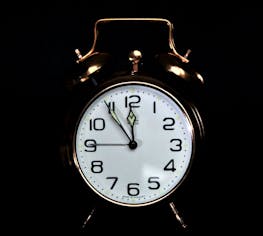The Miracle Morning Summary
The Not-so-obvious Secret Guaranteed to Transform Your Life Before 8AM
You've heard the saying, 'Today is the first day of the rest of your life.' Well, according to Hal Elrod, a morning ritual comprising of six steps is all we need to get started.
The Miracle Morning details the importance of creating a morning ritual consisting of six simple activities, that we can utilize to start building the life we've always wanted.
Author Hal Elrod is a renowned life and business success coach. According to Elrod, how we wake up each day and our morning routine (or lack thereof) dramatically affects our levels of success in every single area of our life. 'Focused, productive, successful mornings generate focused, productive, successful days – which inevitably create a successful life.' So if you have trouble waking up in the mornings, and want to be more focused and dedicated throughout the day, then this book is a great starting point.
Elrod provides us with six essential habits to begin any productive morning, using the acronym SAVERS. And it's these six habits, stacked together, and used to start each day, that saved Elrod's life. Silence, affirmations, visualizations, exercise, reading, and scribing should start each day, for the rest of your life.
This Briefer summary explores the core practices, namely the SAVERS, that are recommended to create magic before 8 am. However, before we talk mornings, we'll look at mindset, and discover why Elrod believes that we need to strive for more than just mediocrity when it comes to creating the life we want
Waking Up Is Our Responsibility
A morning routine can be a lifesaver. We all know that how we start each morning sets the tone for the rest of the day, but it can also set the tone for the rest of our lives.
In Extreme Ownership, Jocko Willink and Leif Babin argue that every day is a series of tests and choices. The very first test we face is waking up. Oversleeping, hitting the snooze button, or delaying getting out of bed determine how we face up to the day ahead. Hence, discipline and taking responsibility are crucial to reaching daily goals and finding success. Willink explains that 'Discipline equals freedom.' The more disciplined we are, the more freedom we have to do the things we want.
Elrod believes that how we wake up is pivotal. He developed his "Miracle Morning" routine after suffering two massive hits. One was a horrific car accident at the age of twenty, that left him with brain damage and numerous broken bones. He was declared dead for six minutes after a drunk driver hit him head-on. After being in a coma for six days, he was told that he would never walk again. The next hit was financial – his business collapsed, and he slid into a crippling depression during the 2008 global recession. Our author says that his life fell apart when his income was cut in half, landing him in massive debt. Not only were the financial effects disastrous, but he was mentally, physically, and emotionally spent. Elrod says that he hit rock bottom and felt an extreme sense of anxiety and depression. He read numerous self-help books, went to workshops and seminars, but nothing worked.
When Elrod looked at these experiences together, he realized that he had to take responsibility for his life, his actions, and his future. And according to our author, the best place to get started is in the morning. A morning routine is what energizes us and allows us to face life "head-on." Elrod is so confident that he claims The Miracle Morning method will improve any area of our lives, and is the most straightforward approach to creating the life we want.
Wake Up To Responsibility
How often do you compare yourself to other people?
Elrod argues that this isn't always a bad thing. Reframing how we compare ourselves to others can be helpful. For example, we should start thinking about the fact that if a person can overcome a huge obstacle, then so can we. We need to embrace the perspective that other people provide evidence that anything can be overcome, no matter our circumstances, provided we take responsibility and have the desire to get to where we want.
The first step is that we need to accept total responsibility for every single aspect of our lives. We came across this idea in Extreme Ownership, where we're taught that the only way to solve problems is to own them. So often we blame others, blame external factors. Still, as Elrod explains, 'The degree to which you accept responsibility for everything in your life, is precisely the degree of personal power you have to change or create anything in your life.'
In 2008 Elrod turned his life around by taking the first step and telling a friend that his life was miserable. His friend suggested that he start running, and although he was reluctant, Elrod took the advice and went for a run. This run was the catalyst for significant change and inspired our author to implement other meaningful changes in his life. He created a "daily personal development routine," and it worked. The result was "Miracle Morning."
Wake Up To Mediocrity
The first step to taking responsibility is to ask ourselves, 'Are we living up to our full potential?'
Most of us live mediocre lives, but have massive hidden potential. No one is going to help us reach our potential, so it's up to us to decide to be better. Elrod says that, 'Your entire life changes the day that you decide you will no longer accept mediocrity for yourself.' Mediocrity is a decision that we make for ourselves; it's not something that is thrust upon us.
Evidence shows that most Americans fall short of their potential. The Social Security Administration says that out of 100 people, observed for 40 years from the beginning of their working life, most will be mediocre. One will become wealthy, four will be financially stable, 36 will have died, and 54 will rely on others for support. This is a grim picture of people just "getting by," as opposed to leading fulfilling lives. And it's not just the financial insecurity that people face. Numerous studies show that the use of prescription drugs is on the rise, half of marriages in America end in divorce, there's an obesity epidemic, and incidents of heart disease and cancer are increasing.
Despite this bleak picture, we can all make the necessary adjustments to lead better lives and to reach our potential.
Wake Up To Potential
What prevents us from reaching our full potential?
According to Elrod, there are three factors that we need to address. The first is rearview mirror thinking. So many of us view our lives in relation to past experiences. We're often so caught up in our perceived limitations that we fail to move forward. We need to shift our attention to the road ahead by embracing positivity and confidence.
The next factor is that we view small actions in isolation. We've all thought to ourselves, 'It doesn't matter if I have this slice of cake now, I'll start my diet tomorrow,' or, 'I can skip the gym today, I'll try again tomorrow.' While it's OK to have treats and to take a day off once in a while, the problem with minor exceptions is that they add up. Small exceptions become the norm, and we fall into bad habits very quickly. Each decision that we make has a compound effect, and we need to realize that our lives are a sum of each decision we make.
Finally, there's the idea that we're influenced by the people that we hang around. Who are the five people that you spend the most time with? According to Elrod, we are a product of the people we spend the most time with. The circle of influence means that we'll likely be negative if we're surrounded by five negative people. Whereas if we spend time with five positive and driven people, they will inspire us to reach our potential.
Wake Up To Success
Why should we settle for less?
Whether it's health, happiness, relationships, work, or financial freedom, we need to stop accepting less than what we deserve. But, how do we achieve this kind of success?
Elrod explains that we need to focus our attention, each and every day, on who we are, and who we want to become. We need to change the way we approach our days and develop a morning routine to focus on development and productivity. Our author says that all we need to do to move from mediocrity to success, is to change how we wake up, and how we face each day.
Wake Up To Routine
A pre-morning routine helps us to get going. The first rule of starting each day is to stop hitting the snooze button, and reframe how we think about sleep.
We're all tempted to hit snooze, some more so than others, but by doing this, we delay the inevitable and make a subtle but profound change to our mindset. It's those mornings when we feel the most reluctant to get out of bed, that we should be the most determined. Tough patches are made more challenging when we wallow and delay the inevitable. Elrod suggests that we should "make our purpose bigger than our problems." Having a deep sense of purpose creates excitement, and this means we're more focused and energized.
This might sound like bad news for night owls, but Elrod explains that starting a routine immediately, means we're less likely to skip and delay important things such as exercise. No one is resistant to temptations and distractions, so the sooner we tick things off our list, the better.
However, there are some ways to make getting into the routine a lot easier. For starters, remember that a good morning starts the night before. This means getting enough sleep. And often, we're our own worst enemies when it comes to sleep. How often do you go to bed thinking, 'This is far too little sleep, I'm going to be so tired tomorrow'? By doing this, we've ruined the next day before it's even started. Elrod argues that if we tell ourselves that we'll feel refreshed and ready for the day ahead; no matter how much sleep we get, it'll feel like enough.
And, if you're the type of person who can't resist hitting snooze, then why not put your alarm somewhere where you have to get out of bed to turn it off. It's a lot harder getting back into bed once you're out. And if you're still tempted for a snooze after this, put on your workout clothes, brush your teeth, and have a glass of water.
Once you've done this, you can get started on making your way through the six steps that constitute a miracle morning.
Wake Up To Silence
It's argued that practicing purposeful silence each morning helps to fight stress and gain clarity. Whether it's meditation, prayer, reflection, deep breathing, gratitude, or a combination of these, we should all make time for moments of silence. As long as we start the day in a way that's quiet, reflective, and where we feel connected to something bigger than ourselves, we're on the right track.
Wake Up To Affirmations and Visualization
Affirmations and visualization can help us create the life we want.
We've learned about the importance of positive thinking in books such as The Power of Positive Thinking, The Power of Now, and Flourish. Affirmations are a core ideal of positive thinking and allow us to change negative thoughts into more positive ones.
According to Elrod, 'Research shows that the average person thinks somewhere between 50,000 and 60,000 thoughts on any given day.' However, rearview mirror syndrome makes us dwell on the negative, and these thoughts are unhelpful and make us slip into mediocrity. In order to switch our mindset, we can use positive affirmations to remind ourselves that we are worthy and valuable. It might seem a strange practice at first, but all of us need to do positive self-talk so that we can stop being bombarded with negative thoughts, which do nothing but hold us back. Muhammad Ali was known for repeating, 'I am the greatest.' It's this affirmation that led him to believe it was true, because once a belief becomes a conviction, everything starts to shift.
Visualization is another weapon that we have in our positivity arsenal. This practice makes tasks easier because our brains use the same neural circuits they do when we actually physically engage in these tasks. It's scientifically proven that people who visualize, display nearly the same physical improvement as people who practice. Hence, through visualization, we can improve ourselves by engaging all aspects of ourselves.
Affirmation and visualization are incredibly powerful and help to change our perspective on our daily routines.
Wake Up To Exercise
Plato said that 'For man to succeed in life, God provided him with two means, education and physical activity. Not separately, one for the soul and the other for the body, but for the two together. With these means, man can attain perfection.'
Exercise doesn't just keep us fit, but it's good for the whole body. Healthy brains need us to exercise. When we exercise, the brain releases dopamine, norepinephrine, and brain-derived neurotrophic factors (BDNF). Have you ever noticed how much sharper and more focused you are after exercising? Well, these chemicals are to thank for that.
In the groundbreaking book Spark, we learned about the remarkable impact exercise has on students' grades and wellbeing. The gym teachers at Naperville High conducted an educational experiment called "Zero Hour P.E," where they scheduled students to work out at 7 am before class. It was revealed that students who exercised were more focused and better behaved, and what's more, their grades significantly improved.
So the lesson is that we all need to find an exercise that we can commit to, because exercise gives us an increased ability to absorb knowledge.
Wake Up to Reading and Scribing
We should never stop learning, and personal development is a key marker of success.
Once we've completed our morning exercise, it's the perfect time to read a few pages of a book. Whether you want to read self-help, inspiration, or fiction, literature is one of the best ways to gain new insight into the world and ourselves. Just reading ten pages a day means 3650 pages a year, which equates to about 15 books.
And it's not just reading, but writing that we need to focus on. Mental notes often fade, but the simple act of writing something down makes the idea stick. Rolf Smith brilliantly said, 'The problem with making mental notes is that the ink fades very rapidly.'
Get into the habit of carrying a notebook around with you and write down the ideas you have and the things you have learned. Write down how you feel, the insights you've gained, lessons you've learned, what you're grateful for. Everyone needs to read more and write more, because these practices lead to significant changes.
Commit to 30 Days
The Power of Habit and Atomic Habits taught us how important it is to develop and foster good solid habits.
Willpower is at the heart of creating habits, and according to our author, a habit takes between 20-120 days to develop. For the sake of this exercise, our author says that we can create a habit in 30 days.
We've learned from Eat That Frog that the best way to attack a task is to divide it into more manageable parts. Elrod applies the same logic and says that we can create a new habit in 30 days, and make it easier by dividing it into three parts. In the first ten days, we have to commit wholeheartedly to our habit. If we break the chain, we need to start again. After this, it'll be a lot harder to break the developing habit, even though it might be uncomfortable at first. The last ten days are where the magic starts to happen; the new habit might even become enjoyable, or at the very least, highly rewarding.
Approaching a habit in this way is helpful because it allows us to commit to smaller goals that form the larger picture. It's a lot easier to push through ten days than it is to start with the end goal of 30.
When Elrod started running, he hated it. However, he committed to the 30-day challenge. During the first ten days, Elrod wanted to give up. He fought with his inner voice each day, who told him it was okay if he wanted to throw in the towel. He no longer hated running during days 11 to 20, and it started feeling more normal to him. Finally, as the last phase rolled around, he thought that it had almost become enjoyable.
So maybe it's time to tackle that one thing that you've been wanting to start doing but have never had the determination or motivation to do?
In Conclusion
What do you want your story to be?
We're all in the process of writing our life's story, and no good story is without a hero or heroine overcoming their fair share of challenges. In fact, the bigger the challenge is, the better the story is. All of us need to embrace every challenge and use it to make our life stories better. Furthermore, Elrod explains that the key is 'to not wish for our challenge not to be there, but rather for the strength to endure and overcome.' And, our author's own life is an excellent testimony to this.
This might be just the book to set you on the path of creating the best story for your life. Focus on your challenges, own up to what you need to do, and stop making excuses for not living up to your potential.
Miles Davis said, 'My future starts when I wake up every morning. Every day I find something creative to do with my life.' So why not make tomorrow morning your very first miracle morning?




